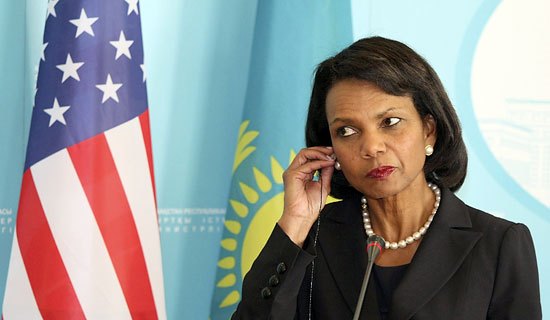I apologize for the lack of posts since Wednesday as I am in the middle of a move from New York to California. Today I would like to go over a few important stories that have occurred in the last week.
Ahmed Wali Karzai a Drug Dealer? – The New York Times ran an article last week, citing American and Afghan sources, accusing President Karzai's brother, Ahmed Wali Karzai, of being involved in the heroin trade in Afghanistan. Ahmed Wali and his brother have denied these reports, calling them ‘baseless,’ and arguing that they spring from political pressure that the Karzai government has put on the US recently regarding civilian casualties. The New York Times report centers around informants’ descriptions of two large drug shipments intercepted by Afghan police that showed strong links to Ahmed Wali, including a phone call where he told the government to leave the shipment of heroin alone since it was his.
I have discussed the importance of the drug trade in Afghanistan before on this page, mainly as it relates to funding the Taliban, and regarding the combating and neutralizing of the growing practice, not punishing corrupt officials and major civilian perpetrators, like the suspected Ahmed Wali, was not part of the prescribed plan. There is a consensus that for the Afghan government to gain legitimacy and strength in all of the nation's regions it must show it can combat the drug trade and its perpetrators, especially those who are involved in government. For the people of Afghanistan, and for us in America and NATO who send our soldiers over there, the Afghan government must not be seen as impotent or corrupt, and this case shows both. There is the obvious fear that if Karzai actually prosecuted corrupt drug officials in his government, the breadth of the indictments would cause great instability and may further its lose of legitimacy, and this is most likely the reason the US has not pushed him too hard, but something must be done.
 Condoleezza in Kazakhstan – US Secretary of State Rice made a one day stopover in Astana last week and held a press conference with Kazak Foreign Minister Marat Tazhin. She and Tazhin stated that Kazakhstan and the US were 'strategic partners’, but that Kazakhstan had ‘excellent contacts’ with Russia and all of its neighbors. In recent weeks, after the Georgia conflict, Russia's President Medvedev has laid out in several speeches that Russia has a special sphere of influence, and Rice made several comments combating any thought that this involved Kazakhstan; “We don't see any of this as a zero-sum game. We don't see and don't accept any notion of a special sphere of influence and so we look forward to continue to building our relationship with Kazakhstan.” Another major issue addressed was Kazakhstan's role in stabilizing and helping in the economic development of Afghanistan, including infrastructure and energy projects. Though Rice and Tazhin did not explicitly discuss this during the news conference, there is also no doubt that energy relations were a hot topic, as Russia has made several successful inroads in Kazakhstan and Uzbekistan since the Georgia crisis and West has been put on its heals.
Condoleezza in Kazakhstan – US Secretary of State Rice made a one day stopover in Astana last week and held a press conference with Kazak Foreign Minister Marat Tazhin. She and Tazhin stated that Kazakhstan and the US were 'strategic partners’, but that Kazakhstan had ‘excellent contacts’ with Russia and all of its neighbors. In recent weeks, after the Georgia conflict, Russia's President Medvedev has laid out in several speeches that Russia has a special sphere of influence, and Rice made several comments combating any thought that this involved Kazakhstan; “We don't see any of this as a zero-sum game. We don't see and don't accept any notion of a special sphere of influence and so we look forward to continue to building our relationship with Kazakhstan.” Another major issue addressed was Kazakhstan's role in stabilizing and helping in the economic development of Afghanistan, including infrastructure and energy projects. Though Rice and Tazhin did not explicitly discuss this during the news conference, there is also no doubt that energy relations were a hot topic, as Russia has made several successful inroads in Kazakhstan and Uzbekistan since the Georgia crisis and West has been put on its heals.
Turkmenistan's New Constitution – In very late September the government of Turkmenistan adopted a new constitution which seemed to be largely aimed at securing foreign investors and not its citizens’ rights. The constitution abolished former dictator Niyazov's 2,500 hand-picked legislature and replaced it with a 125 member elected parliament. President Berdymukhammedov made a statement that these parliamentary elections, set for December, would be monitored, but by whom it remains unclear. The constitution also sets the presidential term at 5 years, but it is unclear if there were term limits, but this is highly, highly doubtful. The president was also given the power to appoint regional governors, just like Putin instituted a couple years back. On the positive side, the new constitution did several things to increase commerce and the freedom of investment in the nation. Property rights were strengthened along with market-economy principles, both in hopes of soothing the fears of foreign energy investors. I do not know all the ins-and-outs of this new legal document and only time will tell if it provides for any real progress in the country's citizen rights and freedoms. A recent protest by Reporters Without Borders at the Turkmen embassy in Paris for the release of journalist Annakurban Amankiychev and human rights activist Sapardurdy Khajiyev, both in jail since 2006, showcases how far the country has yet to go in providing a safe and secure life for all its citizens, no matter what their beliefs or political leanings.
(Photo Source: International Herald Tribune)